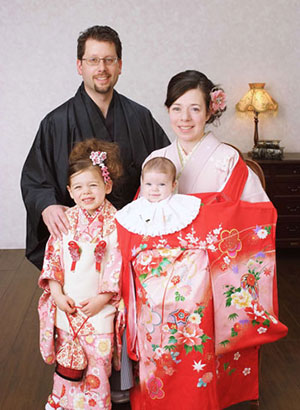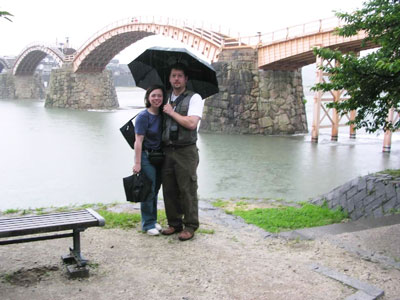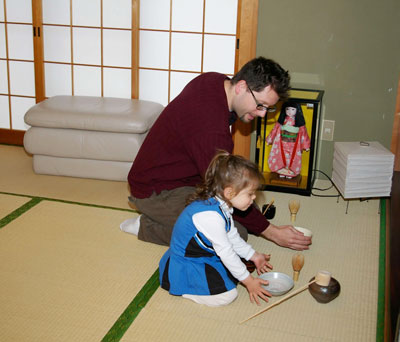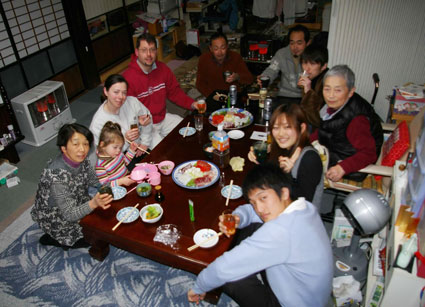- YouTube
- TikTok
Couple aims to change lives through Japan study abroad endowment
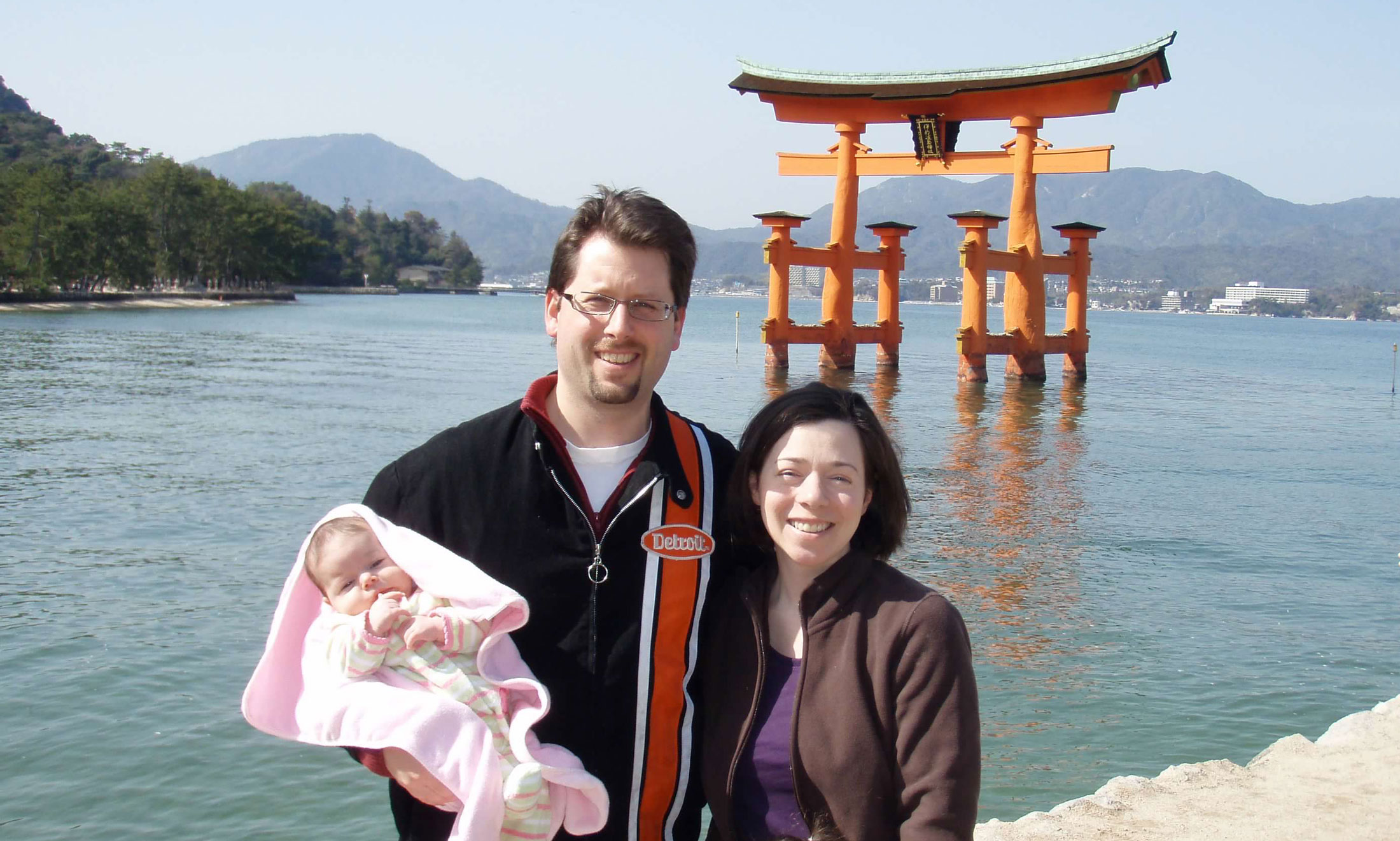
Michele and Karl Plattenberger, with daughter Celia, at Miyajima Island near Hiroshima, Japan.
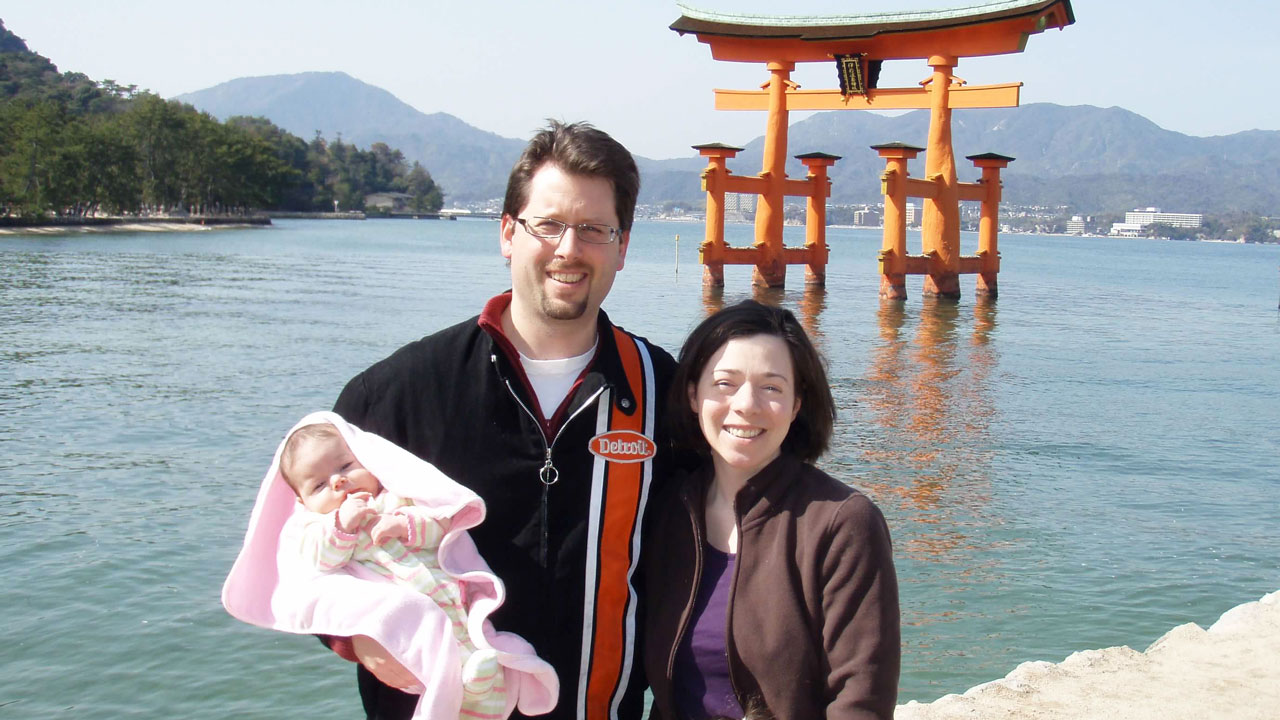
If you want to change your life and the way you see the world – study abroad.
Plattenberger family, pictured clockwise from left: Karl, Michele, Celia and Minna. |
That’s advice from Michele and Karl Plattenberger, worldly souls who know a thing or two about the life-altering, mind-opening effects of living in a foreign land. As an OU student in the mid-1990s, Michele studied at the Japan Center for Michigan Universities, an educational center in central Japan that offers study abroad programs for students at the state’s 15 public universities. On a whim, she applied for a scholarship that would make the yearlong experience possible.
“At first, I didn’t win it,” she recalled. “But just before the start of the program, I found out that the winner had backed out, and the next thing I knew I was on a plane to Japan. The first night I was totally freaked out, but after being introduced to the people, it was an amazing experience. It was like doing a puzzle when you’re missing the last piece, and you finally find it. I fell in love with the country, the culture and the people, and I knew I wanted to continue my Japanese studies.”
After graduating with degrees in engineering and East Asian studies, with a focus on Japan, Michele worked full time at Ford Motor Company, putting her technical expertise and language skills to good use. She eventually went to work on the company’s joint venture with Japanese automaker Mazda, traveling to countries throughout East Asia, including the Philippines and Japan. Bilingualism fueled her career as she gained a reputation as the go-to person for translating engineering instructions between Japanese and English.
“Every job I ever had during my 16 years at Ford, and even after I left, my credentials got me the interview,” she said. “But it was the fact that I studied abroad and knew a foreign language that got me the job.”
Living in Japan
Michele and Karl at the Kintai Bridge, a historic wooden arch bridge in the city of Iwakuni, in Yamaguchi Prefecture, Japan. |
In 2003, Michele and husband Karl, also a Ford engineer at the time, moved to Japan where both worked on the Ford-Mazda venture. They made a conscious effort to be fully immersed in the culture.
“When we moved there, we realized the amazing opportunity we had to become part of the community,” Karl said. “The way moves are structured, they show you three houses and you have to pick one. For us they showed nine places, including one that was way off the beaten path. It was clearly a Japanese neighborhood, outside the comfort zone of the expat communities. We knew it was the place for us.”
Over the next six years, the couple lived and worked in their adopted home, growing their careers, starting a family and building connections with friends and colleagues. They embraced their new surroundings, which contrasted sharply with life in the U.S. Working at the Mazda headquarters in Hiroshima, the pair was particularly struck by the collaborative spirit that defined Japanese work culture.
“From a Western perspective, it might seem like people are checking up on you. But what they’re really doing is looking to see if anyone is struggling so they can immediately respond to issues and provide support,” Karl said. “The open environment makes it really easy to engage with colleagues.”
Honor is also a cornerstone of Japanese culture, Michele added, and must be taken into account in workplace interactions.
“The concept of saving face is very important in Japanese and other Asian cultures,” she explained. “They don’t want to tell you they can do something if they don’t fully understand it. You have to figure out how to work with people in ways that work out in everyone’s favor.”
Sharing knowledge
Karl and Minna practice a traditional tea ceremony at their home in Hiroshima, Japan. |
While in Japan, Michele maintained her OU connections and assisted with accreditation efforts for the Japanese program. She also developed an interest in teaching Japanese and was hired as a special lecturer soon after returning to Michigan.
Today, she continues to work in the auto industry, teaches evening classes at OU and is also pursuing a doctorate in adult education, with a focus on Japanese language acquisition. In addition, she is an avid supporter of OU’s chapter of the Society of Women Engineers, whose mission is to help women achieve their full potential in the profession.
Michele’s passion for sharing her knowledge has not gone unnoticed. In 2017, she received Oakland University’s Excellence in Teaching Award, given to non-tenure track faculty who display superior teaching and the ability to inspire students. In her role as an educator, she frequently draws on her experiences living in Japan and encourages students to study abroad.
“I always tell my students to do something with study abroad, even if it’s just for a semester,” said Michele. “But funding can be a barrier a lot of times.”
Supporting study abroad
The Plattenbergers celebrate New Year's Eve 2007 with friends in Japan. |
To help break that barrier, Michele and Karl started funding a Japan study abroad scholarship each year during OU’s All University Fund Drive. Thus far, their generosity has supported study abroad experiences for four students, and they recently set up an endowment to ensure the scholarship’s existence for years to come. Along with meeting academic requirements, applicants must submit an essay about what it means to be an ambassador for the United States and Oakland University.
Associate Professor Akiko Kashiwagi-Wood has worked with Michele in the Japanese program for over nine years. She agrees the endowment will help students who might not otherwise be able to study abroad.
“Many of our students are working to support themselves, and sometimes helping their family as well,” she observed. “So study abroad can pose a significant financial challenge.”
But what really makes the scholarship valuable, she said, is the incredible payoff students get when they go on a study abroad.
“It helps them learn a foreign language,” she said. “Not just a spoken language, but an unspoken language – the norms and nuances that permeate a culture. Things you can’t really learn until you experience them for yourself. We in the Japanese program are beyond grateful to Michele and Karl for making these experiences possible for OU students.”
For the Plattenbergers, the endowment reflects a deeply held belief in the transformative power of living and learning abroad.
“We believe in the value of study abroad,” said Karl. “When we were younger, it was thought of as something exotic or even crazy, but the world is a very diverse place. The best societies and economies are the ones with an open exchange of cultures and ideas.”
Michele shares her husband’s sentiment, noting that exchange of cultures and ideas transforms lives – the best reason to invest in study abroad opportunities.
“When you reach beyond the bounds of traditional education, it changes you in ways you can never anticipate,” she said. “When you immerse yourself in an entirely different culture, you see all these other factors that you didn’t see before. And once your mind is opened, you see the world, and people, and life through different eyes. That’s the power of study abroad, and the purpose behind our endowment.”
About the Michele and Karl Plattenberger Japan Study Abroad Endowment
- Open to undergraduate students with a declared major or minor in Japanese
- Must be enrolled in JPN 1150 or above and possess a minimum 3.1 cumulative GPA
- Must participate in an OU-approved study abroad program that provides academic credit
- Must submit a personal essay and one letter of recommendation from a faculty member in the applicant’s major department
To learn more about the Michele and Karl Plattenberger Japan Study Abroad Endowment, contact the Department of Modern Languages and Literatures at (248) 370-2060. For more about study abroad and study away opportunities, contact the Office of International Education at (248) 370-2889 or [email protected]. For more on how to support OU scholarships and programs, visit oakland.eu/giving.


 February 10, 2021
February 10, 2021